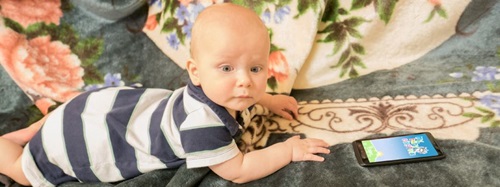Commercial-Free Childhood
an interview with Susan Linn by Rachel Barth
|
June 2012
Susan Linn is the director of the national advocacy group Campaign for a Commercial-Free Childhood (CCFC), and an internationally acclaimed expert on the impact of media and marketing on children. For years she has worked tirelessly to draw attention to the impact of commercialism on modern childhood. I was privileged to interview Susan about her work several weeks ago.
What troubles you about the current trend of marketing to children?
Susan Linn: That it's so pervasive—and so harmful. The exploitation of children for profit has always troubled me. But today we're seeing an unprecedented convergence of unregulated marketing that targets children with ubiquitous, miniaturized screen media. We've gone from TV and home computers to hand held devises, tablets, and cell phones, which allow marketers just about 24 hour access to children. And commercialism is a factor in so many problems facing children today, including childhood obesity, eating disorders, family stress, materialistic values, irresponsible sexuality, youth violence, and the erosion of children's creative play. All of these issues are concerning, but the impact of screen media and commercialism on play is the one that troubles me the most. As you know, play is the foundation of learning, creativity, constructive problem solving, self-regulation and the capacity to wrestle with life to make it meaningful.
The name Campaign for a Commercial Free Childhood tells us something about your work. What specific initiatives are you working on?
CCFC works through every legal means possible to help parents raise healthy families by limiting commercial access to children. We're the organization that convinced the Walt Disney Company to give refunds on Baby Einstein videos because they were marketing them as educational with no evidence that's the case. We persuaded Scholastic to stop distributing coal industry PR in 4th grade classrooms disguised as teaching materials. And we have a major effort this year to stop state legislation around the country aimed at placing advertising on school buses.
In recent years we've been intensifying and expanding our focus on reducing children's screen time. A recent study shows that 50% of babies under the age of one are regular viewers of television—for an average of about 2 hours a day. Data vary on the amount of time preschool children spend with screen media, but even the most conservative findings show that children between the ages of two and five average 2.2 hours per day. Other studies show that preschoolers spend as much as 4.1 and 4.6 hours per day consuming screens. Aside from the fact that screens are the primary vehicle for marketers to target children, excessive screen time is linked to childhood obesity, sleep disturbances, poor school performance and other health and social play. Also, it takes young children away from the two activities known to be beneficial for them—hands on creative play and interacting with caring adults.
CCFC is official host of screen-free week—the national celebrating where children, parents, schools, communities and municipalities forgo entertainment screen media and have fun engaging with the world. Screenfree week just ended but people can find out about Screen-free Week 2013 at www.screenfree.org. We're also working with the Alliance for Childhood and other organizations to create a guide to help child care professionals navigate the confusing messages they're receiving about incorporating screen technologies into their programs for children. And we have a grant from Kaiser Permanente to create a strategic plan for helping organizations who work with children to put reducing screen time on their agendas.
What can teachers (or others concerned about the influence of media on children) do to support the children in their care?
It's strange and sad that we've reached a point in society where nurturing creative play, or healthy eating, or taking pleasure in nature have become counter-cultural where the dominant culture dictates against what is best for children. Caregivers can familiarize themselves with how the marketing and media industries are targeting children and some of the consequences of that immersion. They can insure that their centers are an alternative to the media saturated, marketing driven culture children encounter every day. Think carefully about whether to incorporate screen technologies in their center. There are some centers making good, thoughtful use of technologies and other wonderful programs that are choosing to keep their centers screen-free. Whatever choice caregivers make they should insure that most of children's time is spent in active and/or creative play and engaging with each other and caring adults. This is the first time in history that we cannot assume that when children have leisure time they are engaged in active and/or creative play. The most common activity for children around the world is watching television. And now, because of the explosion of video games and games and apps marketed to children, the amount of time children spend with screens is increasing. For the sake of children's health and well-being—and the health and well-being of our society, we have an obligation to make sure that kids have the time, space, silence and inspiration for child-driven active and creative play. It's urgent that we help parents set limits on screen time at home and mitigate the impact of commercialism and screen time on their children. One advantage that teachers and caregivers have today is that there are lots of resources available to help them nurture play, creativity and health. Take a look at our website, www.commercial-freechildhood.org; The Alliance for Childhood, www.allianceforchildhood.org; or www.truceteachers.org, the website for Teachers Resisting Unhealthy Children's Entertainment. And at www.screenfree.org, we have a wonderful materials, not just for organizing screen-free week, but for turning off screens and turning on life all year round.







